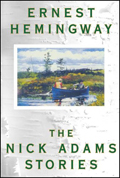A Mistaken Notion: The False Epiphany in Fiction
Justin Chrestman
Mar 20, 2013
By now most of us are probably familiar with the prominent role of epiphany in contemporary American short stories. In his craft book Making Shapely Fiction, Jerome Stern describes the epiphanic story, or what he calls "The Aha! Story," as the shape "of discovery, disillusionment, and revelation." Even as he acknowledges the potential power of this shape, he notes its attendant complications, stating: "The Aha! Story is persuasive, so pervasive, so much the basis for what feels like a story that it presents problems." One of the problems is that the epiphany is used so often that it becomes formulaic. Charles Baxter, in his essay "Against Epiphanies," argues that an overabundance of epiphanies has deformed American fiction. Among his more persuasive charges is that the epiphany has become so overused as to become an unquestioned convention. He goes on to link the epiphany in American fiction to the preoccupation with personal improvement in American self-help culture--a dubious distinction--and to remark on the disproportionate number of grand realizations in fiction as compared to life. We have realizations all the time, he admits, but many of them turn out to be wrong. I read Baxter's essay for the first time ten years ago. His argument is convincing; and yet many of my stories still conclude with epiphanies. In passing, both Baxter and Stern mention a different sort of epiphanic story. Stern notes "another possibility, with its own irony and power, is the story in which the reader has a realization but the character does not." Alternatively, Baxter writes of another possibility:
In passing, both Baxter and Stern mention a different sort of epiphanic story. Stern notes "another possibility, with its own irony and power, is the story in which the reader has a realization but the character does not." Alternatively, Baxter writes of another possibility:
(I do not) think that the insight--if it does come--needs to be valid or true. Stories built from false insights have their own peculiar interest, particularly in a hard-sell society, all of whose economic pressures warp in the direction of secret knowledge that can be cannily merchandised.At the end of this type of story the characters may be unchanged. They may come away with a new, erroneous understanding of the world, or find themselves even more deeply mired in delusion. But the reader experiences a moment of revelation. Often in these stories, it seems to me, the characters not only fail to come to understanding, but often fall victim to a kind of false epiphany.
 |
They were seated in the boat, Nick in the stern, his father rowing. The sun was coming up over the hills. A bass jumped, making a circle in the water. Nick trailed his hand in the water. It felt warm in the sharp chill of the morning. In the early morning on the lake sitting in the stern of the boat with his father rowing, he felt quite sure he would never die.The end of this story has many of the hallmarks of the epiphany as Baxter describes it. There is the rhythmic, elevated eloquence, the moment frozen in time, the world clothed in resplendence. But in this case the epiphany is false. At the risk of stating the obvious, Nick is as mortal as anyone. This false epiphany is powerful in a number of ways. The boy's refusal to accept the fact of mortality echoes the refusal of the Indian man earlier to "stand" the circumstances of his own life. Ironically, the man's refusal ends in suicide. This moment also carries an emotional charge given our sense of the boy's vulnerability in this moment, his confrontation with the violence of childbirth and death, events beyond his understanding. All of this is remarkable, but not as remarkable as the notion that such a basic misunderstanding of the world can be as powerful as insight. Even as Nick denies the possibility of his own death, the story reminds readers of our own mortality--the most fundamental and willfully forgotten fact of our lives.

Comments (1)
Matthew Salesses:
Apr 15, 2013 at 06:35 PM
Comments are the worst, I know, but--that line is not meant to be an epiphany, I don't think, false or otherwise. The epiphany Nick has had was earlier in the story, about life and death and how life is so hard one might kill oneself at a birth instead of celebrate it--mortality, one might call it, not immortality--but since he's a kid, he can't put a name to what he feels or express it except to question whether men often commit suicide. That line at the end is his reaction against the epiphany, not the epiphany itself.
Add a Comment